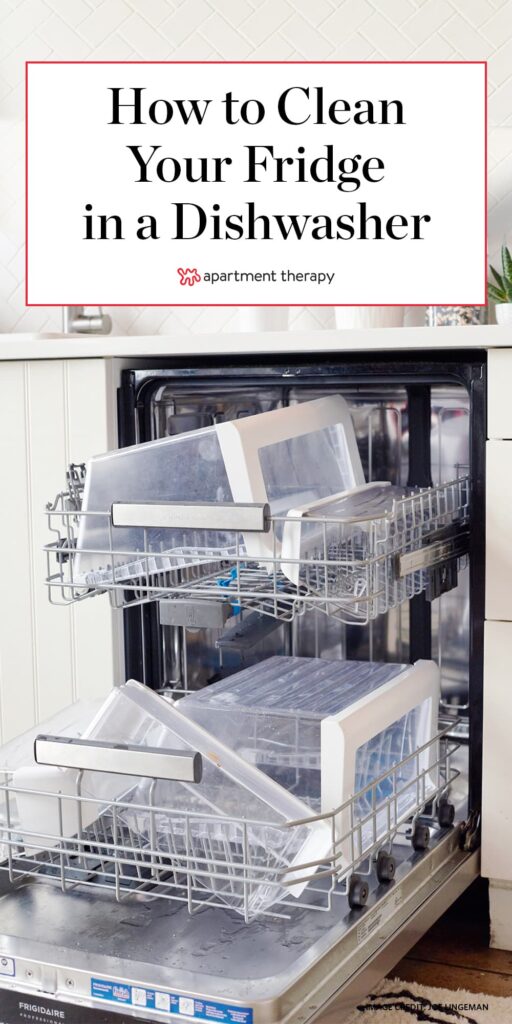Keeping your refrigerator clean and organized is essential for food safety and maintaining a hygienic kitchen. While it’s tempting to toss those messy fridge shelves into the dishwasher for a quick and easy clean, not all shelves are created equal. Some materials can warp or crack under the heat and pressure of a dishwasher cycle, potentially damaging both your appliance and the shelves themselves.
This article will guide you through the process of determining whether your fridge shelves are dishwasher safe, exploring different shelf materials, emphasizing the importance of manufacturer instructions, and providing safe cleaning recommendations to keep your refrigerator sparkling clean without causing any damage.
Dishwasher Safe Fridge Shelves
The short answer is: it depends! While many modern refrigerators feature shelves made from durable, dishwasher-safe materials like glass or certain types of plastic, older models or those with unique shelf designs might not be suitable for machine washing. Always err on the side of caution and double-check before subjecting your fridge shelves to a dishwasher cycle.
A quick visual inspection can sometimes provide clues about a shelf’s dishwasher safety. Look for labels or markings indicating “dishwasher safe” or “BPA free.” These indicators often appear on the underside or edges of the shelves. If you’re unsure, consult your refrigerator’s user manual for specific cleaning instructions.
Refrigerator Shelf Materials
Understanding the materials used in your fridge shelves can help you determine their dishwasher safety. Here are some common materials and their suitability for machine washing:
Glass Shelves
Glass shelves are generally considered dishwasher safe, as they can withstand high temperatures and harsh detergents. However, always check for any specific instructions from your refrigerator manufacturer, as some glass types might be more delicate than others.
Plastic Shelves
Plastic shelves can vary in their dishwasher safety depending on the type of plastic used. Some plastics, like polypropylene (PP) or polyethylene (PE), are generally dishwasher safe. However, other plastics, such as polystyrene (PS) or acrylonitrile butadiene styrene (ABS), might warp or melt in a dishwasher cycle.
Wire Shelves
Wire shelves are typically not dishwasher safe due to the potential for rusting and damage from water exposure. It’s best to hand wash wire shelves with warm soapy water and dry them thoroughly.
Manufacturer Instructions
Always prioritize your refrigerator manufacturer’s instructions when determining the appropriate cleaning method for your shelves. These instructions will provide specific guidance based on your model and materials used.
Look for a label or sticker on the underside of the shelves, consult your user manual, or visit the manufacturer’s website for detailed cleaning recommendations. Following these instructions ensures you clean your shelves effectively while avoiding potential damage to both the appliance and the shelves themselves.
Cleaning Recommendations
If your fridge shelves are dishwasher safe, follow these tips for a thorough clean:
- Pre-wash: Remove any large food debris or spills before placing the shelves in the dishwasher.
- Detergent Choice: Use a mild dishwashing detergent formulated for both hand and machine washing. Avoid harsh chemicals or abrasive cleaners that could damage the shelves.
- Load Placement: Place the shelves on the top rack of your dishwasher to avoid contact with heavy pots or pans that could cause breakage.
For non-dishwasher safe shelves, opt for a gentle hand wash:
- Warm Soapy Water: Fill a sink or basin with warm water and add a few drops of dish soap.
- Gentle Scrubbing: Use a soft sponge or cloth to gently scrub the shelves, paying attention to any stubborn stains or residue.
- Rinse Thoroughly: Rinse the shelves thoroughly under running water to remove all traces of soap.
Appliance Damage Prevention
Improper cleaning practices can lead to damage in your refrigerator. Avoid using abrasive cleaners, steel wool, or harsh chemicals as they can scratch and damage the surface of your fridge shelves.
Additionally, never place hot, wet shelves directly into a cold refrigerator. Allow them to cool down gradually to prevent condensation buildup and potential warping.
Conclusion
Determining whether your can you put fridge shelves in dishwasher is crucial for maintaining both the cleanliness and longevity of your refrigerator. By carefully examining your shelves’ materials, consulting manufacturer instructions, and following safe cleaning practices, you can ensure a sparkling clean refrigerator without risking damage to your appliance or its components. Remember, when in doubt, always err on the side of caution and opt for hand washing to protect your investment.



